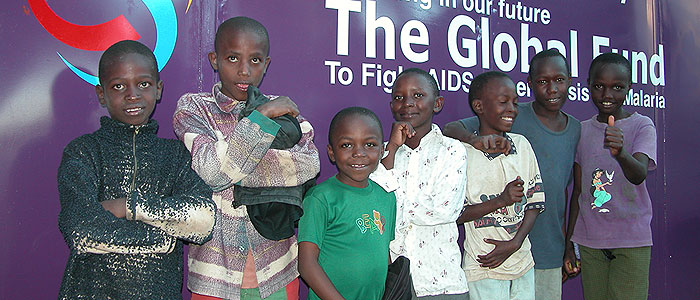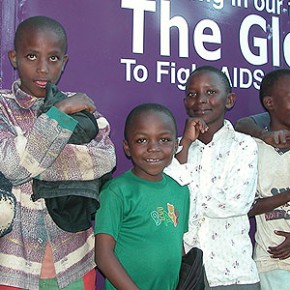* This article was published in the Global Fund Observer (English – French), Aidspan‘s newsletter, and republished in The First Tranche, the AidData blog, a forum for analysis and discussion of information about development finance, and in the EQUINET newsletter.
I was in Nairobi recently to facilitate a meeting with the representatives of about 30 organizations from Eastern and Southern Africa involved in the monitoring of global health programs. The group, a mix of health advocates, human rights activists, data experts, journalists, as well as representatives of donor and government agencies, is a sample of those who hold the key to turning the open data movement into positive outcomes in developing countries. The meeting was hosted by Aidspan, the independent observer of the Global Fund to fight AIDS, Tuberculosis and Malaria.

When participants, at Aidspan’s invitation, agreed to join forces to share resources, to improve their skills and to coordinate some of their work, an animated exchange took place on whether ‘watchdog’ was an appropriate description of their common functions. Some felt uncomfortable to be associated to a culturally-sensitive animal. Others thought that it seemed too confrontational. A watchdog doesn’t sound like a man’s best friend. Dogs bite.
Who watches the dog?
The field of transparency is packed with vocabulary that suggests opposition or conflict, ‘factivists’ (a term  coined out of ‘facts’ and ‘activists’ by Bono’s ONE organization), ‘anti-corruption professionals’, ‘transparency revolutionaries’, labels that all imply, somehow, that the watchers are above the watched, like white knights fighting the dark forces of development aid, the corrupt and incompetent.
coined out of ‘facts’ and ‘activists’ by Bono’s ONE organization), ‘anti-corruption professionals’, ‘transparency revolutionaries’, labels that all imply, somehow, that the watchers are above the watched, like white knights fighting the dark forces of development aid, the corrupt and incompetent.
– …and who watches the dog? someone dared asking, triggering a few chuckles in the room. How will watchdogs be held accountable themselves?…
Not surprisingly, the question came from a representative of the ‘powerful’, a member of a Country Coordinating Mechanism (CCM) that oversees the implementation and use of millions of dollars in grants against HIV/AIDS, tuberculosis and malaria.
Aidspan, a self-described ‘friendly watchdog’, spent the last three years laying the foundation for a partnership of people who don’t usually work together, such as CCM members and independent transparency activists. The idea is to send the message that raising accountability in development aid is in everyone’s interest, to break away from a confrontational attitude, to facilitate access to decision makers and to benefit from working alongside people who are in a position to influence change at all levels.
Sometimes, holding people and organizations to account needs teeth, especially in young democracies and fragile states with no mutual checks and balances. Whistleblowing, naming and shaming may be the only option, such as when dealing with corruption. But what Aidspan’s experience suggests is that open data’s main benefit might be in helping to address inefficiencies and mismanagement, and in this regard, confrontation may not be the shortest route to achieving results.
Open data’s best chance: people with open minds
Later that evening, Jeff, a public health governance expert from South Africa who was co-facilitating the meeting with me, shared some insight on his experience dealing with government officials in the region. How did Jeff, as he said, manage to make them change some of their practices? It all comes down to putting yourself in the shoes of the person in front of you, he explained, trying to understand his/her reality, fears and needs.
– I tell them: ‘You managed to achieve a 67% success rate. This is impressive given the conditions in which you work. Now how can I help you to do even better?’
My conversation with Jeff reminded of my years as a journalist in Canada. I learned over time that I could get my best stories when I was not after a scoop or a problem of some sort. Everything changed when I approached people with an open mind, being aware that asking them to speak in a microphone could be intimidating, taking the time, before recording anything, to introduce myself, to explain what brought me to them, what I was thinking of focusing the interview on, asking whether they were fine with that, adding that if they were not happy with any of their answers, I could edit it out of the story or repeat the question. In short, I tried to make them feel in control of what I was trying to achieve together with them.
In the field of advocacy for transparency and accountability, the little available evidence on the most effective strategies also suggests that, while there is no recipe, collaboration generally offers the best chance to generate positive change, I.e. understanding the political context of the activities that you monitor, targeting the right people, in a non-threatening way, offering solutions as much as identifying problems. In other words, being a successful aid ‘watchdog’ is all about knowing how to approach different people in different circumstances to achieve mutually beneficial goals (on this subject, an interesting 7-post series on the impact and challenges of community-led transparency and accountability initiatives in health and other social sectors, and more particularly, this article on Confrontation and Collaboration – PDF, 360 Kb, pp. 2-4).
‘Africa Health Watch’
 How do you build the demand side of aid transparency? How can open data be used to increase aid effectiveness, to reduce loss and to improve governance? What may immediately come to mind is better data visualization tools, training in processing complex data, etc. But I suspect that one of the most formidable challenges, beyond accessing relevant, timely and accurate data, is to learn to make use of it in a strategic way, with a constructive mind, taking into consideration local political dynamics, the reality and psychology of the people whose performance one aims to monitor and improve.
How do you build the demand side of aid transparency? How can open data be used to increase aid effectiveness, to reduce loss and to improve governance? What may immediately come to mind is better data visualization tools, training in processing complex data, etc. But I suspect that one of the most formidable challenges, beyond accessing relevant, timely and accurate data, is to learn to make use of it in a strategic way, with a constructive mind, taking into consideration local political dynamics, the reality and psychology of the people whose performance one aims to monitor and improve.
Without such skills in building trust-based relationships, making the ‘powerful’ accountable will be a steep uphill ‘battle’ for aid transparency advocates, even if they’re ‘armed’ with the best open data tools and resources in the world. To start with, words matter. Meeting participants in Nairobi got that and decided to drop the ‘watchdog’ label. Their new partnership will be called Africa Health Watch. Let’s wish them success in their efforts to track and improve how aid resources are used to save and improve lives against AIDS, TB and malaria.





Great conclusion Robert. The transparency movement needs more pragmatic politics all round.
Bill